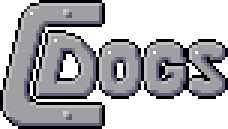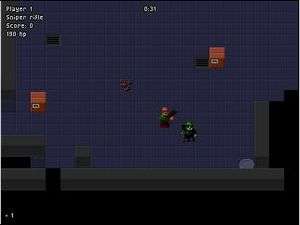C-Dogs
| C-Dogs | |
|---|---|
 | |
| Developer(s) | Ronny Wester |
| Publisher(s) | Ronny Wester |
| Designer(s) | Ronny Wester |
| Platform(s) | PC (DOS, Linux, Mac OS X, Windows), source ports to additional platforms |
| Release date(s) | Between 1997 and 2001 |
| Genre(s) | Action game |
| Mode(s) | Single player, multiplayer |

C-Dogs, the sequel to Cyberdogs, is a MS-DOS arcade shoot-em-up computer game which allows players to work co-operatively during missions, and against each other in "dogfight" deathmatch mode.
Gameplay
C-Dogs made changes and improvements on the original Cyberdogs game mechanics. The single-player/cooperative gameplay is separated into campaigns, each comprising many missions. Usually, each level involves the player(s) killing enemies (while avoiding harming civilians and team mates) using a variety of pre-selected weapons; collecting keys to unlock special rooms; and picking up required items to fulfill the mission objectives.
The "dog fight" gameplay is the typical deathmatch: players attempt to kill each other for points, in order to gain victory. Only two players can play against each other, by sitting at the same computer and using the keyboard, joysticks or gamepads.
History
The creator of C-Dogs, Ronny Wester, released the precursor to C-Dogs, Cyberdogs, in 1994. The popularity of Cyberdogs and the limitations of its 16-bit protected mode motivated Wester to write a sequel, which was released between the years 1997 to 2001 as Freeware.[1]
Open Source
In 2002 Wester released the source code to the public. Following that Jeremy Chin and Lucas Martin-King ported the game to SDL and released their work under the GPLv2 as "C-Dogs SDL". As of June 2007, Wester no longer maintains a website for C-Dogs but the game continues to live on via the C-Dogs SDL project hosted on GitHub. The open source software port contains a number of enhancements to the original C-Dogs, including high-resolution support, local multiplayer up to four players, enhanced graphics and LAN multiplayer. In October 2015 C-Dogs SDL was updated to SDL2.[2] In April 2016, Wester released the game assets as CC-BY.[3]
Ports
With the source code availability and the initial SDL port, the game was ported later for many platforms: Android,[4] GCW Zero,[5] GP2X,[6] Dingoo,[7] PlayStation Portable,[8] Dreamcast,[9] Nintendo DS,[10] Wii,[11] Amiga OS,[12] UIQ3 devices such as SE M600 P1i P990 and Motorola RIZR Z8.[13]
See also
References
- ↑ https://github.com/cxong/cdogs-sdl/blob/master/doc/original_readme.txt
- ↑ SDL2 ported, drag and drop on cxong.github.io/cdogs-sdl (25 Oct 2015)
- ↑ "C-Dogs (SDL) Datafiles README". GitHub. 2016-04-16. Retrieved 2016-11-22.
- ↑ C-Dogs - Google Play Store
- ↑ Dingoonity
- ↑ C-Dogs2X
- ↑ C-Dogs2X
- ↑ cdogsPSP
- ↑ C-Dogs SDL DC
- ↑ C-DogsDS
- ↑ C-DogsSDL_Wii
- ↑ aminet.net
- ↑ AnotherGuest
External links
- Ronny Wester's official site for C-Dogs (archived in 2005 on Web Archive)
- C-Dogs SDL - Initial port of C-Dogs to SDL
- C-Dogs SDL fork - Continued fork of C-Dogs SDL